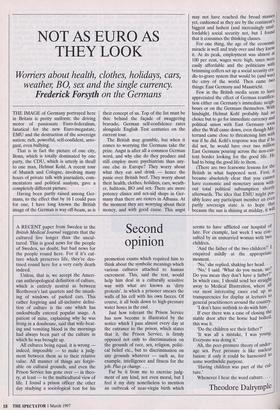A RECENT paper from Sweden in the British Medical Journal
suggests that the cultured live longer than the uncul- tured. This is good news for the people of Sweden, no doubt, but bad news for the people round here. For if it's cul- ture which preserves life, they're des- tined round here for a very early death indeed.
Unless, that is, we accept the Ameri- can anthropological definition of culture, which is entirely neutral as between Beethoven's last quartets and the smash- ing of windows of parked cars. This rather forgiving and all-inclusive defini- tion of culture is the one which has undoubtedly entered popular usage. A patient of mine, explaining why he was living in a dosshouse, said that wife-beat- ing and vomiting blood in the mornings had always been part of the culture in which he was brought up.
All cultures being equal, it is wrong indeed, impossible — to make a judg- ment between them as to their relative value. All manner of things are forgiv- able on cultural grounds, and even the Prison Service has gone over — in theo- ry, at least — to the multicultural view of life. I found a prison officer the other day studying a sociological text for his
Second opinion
promotion exams which required him to think about the symbolic meanings which various cultures attached to human excrement. This, said the text, would help him deal in a culturally sensitive way with what are known as 'dirty protests', in which a prisoner smears the walls of his cell with his own faeces. Of course, it all boils down to high-pressure water hoses in the end.
Just how tolerant the Prison Service has now become is illustrated by the notice which I pass almost every day at the entrance to the prison, which states that it, the Prison Service, is firmly opposed not only to discrimination on the grounds of race, sex, religion, politi- cal belief etc., but to discrimination on any grounds whatever — such as, for example, intelligence and fitness for the job. Plus ca change. . . .
Far be it from me to exercise judg- ment of any kind, not even moral, but I feel it my duty nonetheless to mention an outbreak of near-virgin birth which seems to have afflicted our hospital of late. For example, last week I was con- sulted by an unmarried woman with tw° children.
`And the father of the two children?' I enquired mildly at the appropriate moment.
`No,' she replied, shaking her head. `No,' I said. 'What do you mean, no? Do you mean they don't have a father?, In which case, I should send her straight away to Medical Illustration, where all our most interesting cases end up as transparencies for display at lectures to general practitioners around the country. `I don't have nothink to do with him.'
If ever there was a case of closing the stable door after the horse had bolted, this was it.
`Do the children see their father?'
`It was all a mistake, I was young. Everyone was doing it.' Ah, the peer-pressure theory of under- age sex. Peer pressure is like nuclear fusion: if only it could be harnessed to some worthwhile purpose. `Having children was part of the cul- ture.'
Whenever I hear the word culture. • • •
Theodore Dalrymple


























































 Previous page
Previous page